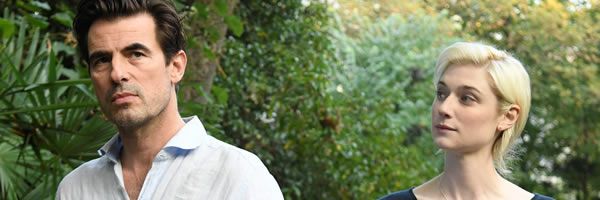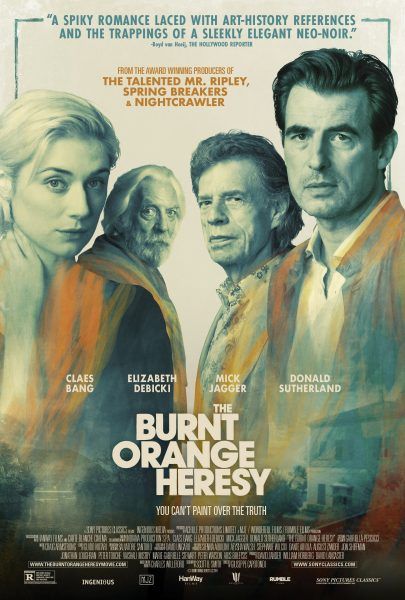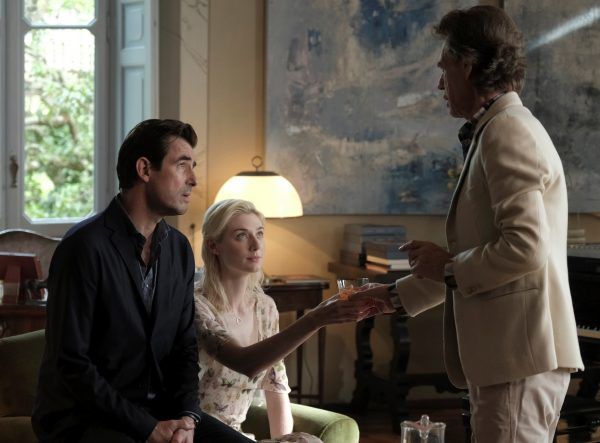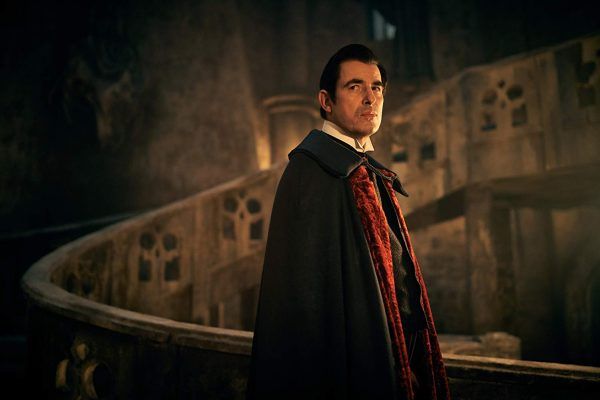[Editor's note: This interview was originally published on March 5, 2020.]
From director Giuseppe Capotondi, the sexy thriller The Burnt Orange Heresy follows art critic James Figueras (Claes Bang), a charming and ambitious man whose fall from grace still clouds his life. His interest is piqued when he meets the mysterious Berenice Hollis (Elizabeth Debicki), who he asks to accompany him on a trip to wealthy art dealer Joseph Cassidy’s (Mick Jagger) villa on Lake Como, not realizing that he’s expected to steal a painting from legendary but reclusive artist Jerome Debney (Donald Sutherland).
During this 1-on-1 phone interview with Collider, Danish actor Claes Bang talked about what a page-turner this script was, the natural chemistry he had with Elizabeth Debicki, sharing scenes with rock icon Mick Jagger and veteran actor Donald Sutherland, playing a character that’s part hero and part villain, and the loss of control you have over the finished product, when you’re an actor. He also talked about the possibility of a second season of Dracula, heading off to shoot Robert Eggers’ next film The Northman, why he’d love to work with director David Lynch, and what attracts him to a project.
Collider: This is such an interesting story to watch. When it came to you and you read the script, was it a real page-turner?
CLAES BANG: Yes, exactly. That’s what it was. And that’s exactly what drew me to it. It really is a page-turner. It was like reading one of those really good novels that you just can’t put down. I was fascinated by this very weird and twisted relationship between James and Berenice. I was just like, “What is this? It’s so crazy. I just wanna do it, right away.” I just wanted to get right in there. That was the main attraction, at the beginning of it, really.
Your character is very mysterious. And then, we meet Berenice and she’s very mysterious, as are Mick Jagger’s character and Donald Sutherland’s character. We don’t know what anybody is really up to. Does that make it fun, or were you a little bit nervous about that unknown motivation?
BANG: That’s what makes you read on, and that’s also why you wanna watch it. You’re like, “What’s going on here? I wanna find out.” I suppose that was actually the driver of it and the main attraction. I wasn’t worried that you’d get confused or bored with it because you couldn’t really figure it out.
What was it like to learn that Elizabeth Debicki was cast, and then Mick Jagger and Donald Sutherland were added?
BANG: Working with Elizabeth was just really, really cool. Quite early on, we had a mutual understanding of the balance of that relationship. It really is what drives that film, that thing that’s happening with these two characters. It’s important that they are equally mysterious, in a way. That drives it. And it was as much fun as I hoped it would be, to do all of those scenes with her. It was really, really cool. You can’t always expect to have that sort of connection or chemistry with your fellow actors or actresses, but sometimes, it does happen. I was also very privileged, recently, on Dracula, where I had the same sort of rapport with Dolly Wells. I’ve been very, very lucky, in that department, with my past projects. It’s really been cool. And obviously, working with Jagger and Sutherland was also amazingly cool. You’ve got this rock icon walking through the door, but he’s so humble. He’s just really about getting it right, and doing exactly what is needed to get the story right. If I sat across a table from Mick Jagger, and I was acting with him and thinking, “Oh, it’s Mick Jagger,” then I’d probably be in the wrong profession. You forget it, the second you start. When the director says, “Action!,” you do it and you work with him like you would, any other actor.
Did you find yourself impressed with him, as an actor? He’s done acting roles before, but he hasn’t done it a ton, so how was he, as a scene partner?
BANG: I think he was amazing. He was very there. He was very present, in the situation, and that’s what you want. It’s not like he was super different. He was as wonderful as Donald and Elizabeth were, really.
In playing this character, did it feel like you were experiencing him as both the hero and the villain, within the same character?
BANG: Yeah, that’s right, but you don’t think about that, on the day, when you do it. You don’t think, “I’m the hero right now,” or “I’m the villain.” You’re just playing that situation, right then, on that day. You do all of the scenes, and then the director starts putting it all together and it gets this balance of a villain or a good guy, or whatever. But on the day, it’s really about getting that scene to work, getting it right, and getting what you need from it, in order for it to fit with the rest of it, but that’s not something that I should be concerned with. I try to concern myself with the bigger arc, before we start shooting. On the day I allow myself to just be there, in the moment, and concentrate on that, to get the situation to move and live, as much as it can get.
You’ve previously talked about being very ambitious and wanting to do your best, when you take on a project and a character, but since you don’t have control over the outcome of the movie itself, and you can really only give your performance and then put it in the filmmaker’s hands, when do you feel creatively satisfied? Is it in the experience that you have, during the shoot?
BANG: Oh, yeah. A lot of days, when you go home, you’re like, “Okay, this actually worked. I think we got it today.” But there are as many days where you’re like, “Fuck, did we get what we needed?” That’s the process of it. That is the thing about this job. The actual storytelling starts when people start fitting the film together, and that’s not something you have any influence over. In that sense, that’s probably the worst part of filmmaking because it is really beyond your control. You just have to give it your best shot, on the day, and then sit and wait, and hope that the people that do the editing will get it right. There are times where you’re like, “How did we end up with this film? Those are weird choices.” But, it’s also a matter of taste. It’s not a given that what I would have done would have been the right thing. It’s just something that you have to come to terms with. It’s a big part of the process. It’s a really, really heavy loss of control. I’ve always felt that. But if you can’t do that, then you can’t do the job.
Have there been any discussions about the possibility of a second season for Dracula? Is that something that’s been talked about, at all?
BANG: That’s absolutely something that I think is being discussed, but I don’t think there’s any news, at all. I haven’t heard anything. I would be super happy to do one more [season]. I’d love to go back with all of those people, and do more. It was were really fulfilling and lovely, and really, really cool to do. This is absolutely the truth, I have actually tried to find out if something was happening, but I don’t think they have started the discussions yet. I think what’s going on is that Netflix and the BBC are evaluating how it’s done, and all of that. So, unfortunately, I can’t tell you anything because I don’t know, at this point. I would actually love to know, and I would love to do one more, but there’s no news in that department yet.
There were never any conversations, during the shoot, about where things could go next?
BANG: I suppose we discussed if we would like to do it, but it’s not been discussed like that, no. We have had a bit of fun with, now that he can actually stand in the sun, the opening shot of the second series would be Dracula, on a beach in Mexico, with one of those tin foil things that you hold up to your face, to get the sun all over you.
You’ve also previously said that you’d love to work with David Lynch, who is a personal favorite filmmaker of mine. What interests you in him, as a filmmaker?
BANG: I don’t think that he’s working anymore. I read that he’s stopped. But I just find his whole universe very, very fascinating. The mystery and that very dream-like quality, that’s still very real and saturated and just really fucking weird, but I love it. That would be amazing to be a part of. His films are some of my absolute favorite film, so that would be cool. I’d really love to do that type of thing.
Do you know what’s next for you? Are you currently working on something now, or do you know what your next thing will be?
BANG: When I’m done with press for The Burnt Orange Heresy, I’m headed over to Belfast to start prepping and shooting a film, called The Northman, which is Robert Eggers’ next film – the guy who did The Lighthouse and The Witch. That’s based on an old Danish saga of Prince Hamlet. So, that’s what I’m doing next.
What kind of character are you playing in that?
BANG: The old saga of Hamlet is what Shakespeare found and turned into Hamlet. I am the evil brother that kills my half-brother and takes over his kingdom and steals his wife. I’m basically Claudius in Hamlet, he’s just called something different here. The story is also a little bit different. It’s not Hamlet. This is more in the family of Greek drama, you could say. It’s gonna be so fucking scary and bloody, and really heavy because they kill each other.
At this point in your life and career, what is it that gets you interested in a project? Does it always start with the script, or is it about more than that, for you?
BANG: It is about the script and the people. It’s about content. It really is. I’ve been very privileged to get do a lot of stuff lately. It’ll always be like that. It will always be concept, script wise, and then personnel wise. That’s what it’s all about for me.
It’s been fun to watch the projects that you’re doing because you’re playing characters that are so complex and have so many layers to them, that you can really dig into. As an actor, is that ideal?
BANG: Oh, yeah, of course it is. In that sense, Dracula was more straightforward, in a way. You know what he is. I think all of it is quite interesting. The Burnt Orange Heresy and The Square were almost hyper-realism and really naturalistic. And with Dracula, it’s heightened or augmented reality ‘cause it’s not really real. It’s fantasy, and that requires a little bit of something else, acting wise. It’s a different expression that’s slightly more elevated, and that’s really interesting, too. I like all kinds. I’ve been very fortunate, very lucky, and very privileged, the last three, four or five years, with what people have asked me to do. I’m very humbled by it.
The Burnt Orange Heresy is scheduled to open in theaters on August 7th.




